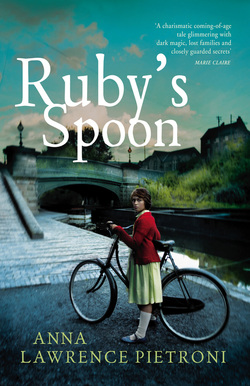
I wasn't sure I'd make it through this book, because the people in this narrative felt so strange and foreign to me. I had trouble imagining this odd world in which a motherless little girl cannot cross a bridge to touch her father. Most reviewers mention the dialect as an obstacle to fluency, but it wasn't quite as difficult for me to navigate as was the odd behavior of the people. Yet, somehow, I found myself slowly moving under its spell. It took me months to get through the first fourth of the book; I kept losing it. Finally, I found my way and then "I couldn't put it down." Trite, but true.
If I were to go back in time and pick up this novel for the first time again, I would treat it more like an academic exercise. I would print out a copy of the map, and write down a character description of each one along with his or her relationship to the others in the town. Having said that, I don't think it is valid criticism when reviewers mention that it is a difficult read or "hard to get into." It simply doesn't belong in the light read category and challenges the reader to pay attention and be aware. I was approaching this as a lazy, summer read, (probably because I bought it for a dollar), yet it is anything but.
Maybe this post will scare people off of reading Ruby's Spoon, but I hope not, because the companion to the challenge of this read was the fact that I was bewitched by it. At first I didn't understand thirteen-year-old Ruby's desperation for attention from the mysterious newcomer, Isa Fly. Perhaps I had lost touch of how much I sought the approval and company of older women when I was a child. (I'm sure that somewhere in my writing I have mentioned a certain dark-skinned woman with a high IQ and a white bikini. From age eight to eighteen I worshiped her, nearly believing that her companionship could turn me into a dark-skinned, bikini clad genius.) So I think the reader can start there, perhaps, by remembering the pure idolatry that a child is capable of. That there might be reasons beyond Ruby's loneliness for her deep desire to connect with Isa makes it all the more fascinating.
Another element here is the aloof behavior of so many people in the town toward Ruby; they fail terribly at the "it takes a village" idea. I kept wondering why everybody seemed so intolerant and often hostile toward her. Some of the women were deeply cruel to her, but it was the removed behavior of those who could have shown her that they cared that had me shaking my head. Then again, this rings with some authenticity from my own experience as a teenager. When I lost my parents at the age of seventeen, there were many words of sympathy, but actions that might disrupt someone's life (or even inconvenience them) were rare.
Perhaps this place and its people are not so foreign to me after all?
For me, one of the only elements of Ruby's life that I cannot understand is why she had no friends her own age. It is mentioned once or twice, I think, that she used to play with her school chums, but there is no other central character under the age of thirty. I imagine in the life of a small town teenager, a girlfriend would be a vital connection to a girl like Ruby,
There is so much to read out there, and so little time. I am ultimately glad that I picked up Ruby's Spoon and I'd be the first one to buy a ticket if it were made into a film. Hopefully Anna Lawrence Pietroni will make a bunch of money off of it, thereby relieving my guilt of getting it from the dollar store. And while I'm imagining wonderful events -- let's hope that Vera Farmiga produces the film and takes the part of Isa Fly.

 RSS Feed
RSS Feed
